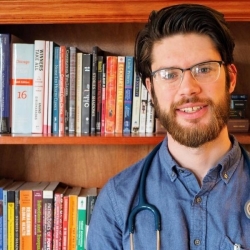Patrick Smith '16 BSN, RN

Complex Care Manager
Fenway Health, Boston
April 15, 2020
I started a new role as a Complex Care Manager at Fenway Health about a month ago. The role is somewhat undefined in its current incarnation, but I have thus far been primarily focused on a few key areas, including (1) following up with complex patients during transitions of care (e.g. hospital discharges); and (2) developing workflows to reach vulnerable patients who are lost to follow up.
Since Fenway has a high census of HIV+ patients, much of my initial focus has been on identifying and coordinating outreach to those with weakened immune systems and other comorbidities (COPD, diabetes, hypertension, heart disease, etc.) that place them at increased risk for severe COVID infection. As I track the course of our initial confirmed cases, I'm seeing a lot of people make a full recovery without complications, while others (including typically healthy, young clinicians) seem to inexplicably end up on full ventilatory support in the ICU. What I think remains to be seen is how Boston's system responds to the expected surge in cases (predicted in 1-2 weeks) and what the longer term aftereffects of the pandemic are for those who have delayed accessing care and those who are now facing new-onset income, housing, or food insecurity as a result of the pandemic.
March 16 Facebook post (used with permission)
Dear friends: amidst the news updates about COVID-19, I have been hesitant to add my voice to the din of editorials that I think may be contributing - in some ways - to an epidemic of panic that has emerged secondary to the novel coronavirus pandemic that we're all facing.
Professionally, as a primary care nurse working with a large census of immunocompromised patients, I have no interest in downplaying the severity of COVID-19. Data from China, Italy, and other countries grappling with the virus are indisputably frightening, and given what we know (and don't know) about asymptomatic transmission, we should all be taking aggressive steps to reduce our individual and collective risk through hand hygiene, social distancing, and other measures outlined by CDC.
Personally, as I try to read and respond to an ever-evolving clinical and political landscape, I am worried about the physical and structural risks that this pandemic poses: health system strain; lost workforce and education hours; the potential for increasing unemployment, food insecurity, housing insecurity; the risk of chronically uncertain isolation conditions contributing to more widespread depression. The list goes on.
In weighing all of this -- the clinical concerns, the anxiety induced by our lack of preparedness and executive leadership, the worry about insufficient social protections for already vulnerable populations -- I have a few asks:
- If you are acutely ill and believe that you may require inpatient hospitalization because you are short of breath and/or cannot keep down fluids, please go to your nearest ER. If you can, call ahead.
If you are young, immunocompetent, and mildly ill (e.g. a temp of <100.4, chills, mild body aches), please do NOT go to your nearest ER. Instead, stay inside, limit your exposure to others, and call your healthcare provider for guidance. COVID-19 is overlapping with cold and flu season, and if you are not severely ill, the clinical management of these is much the same: monitoring, rest, fluids, supportive care, and isolation to reduce your risk of infecting others. Our system is under increasing strain, and the patients and staff in our triage stations will not benefit from your presence as a potential vector of disease.. - If you need help distinguishing between the above 2 instances, call your MD/NP/PA, or call me, and we can talk this through to determine next steps
- Many practices are rapidly shifting to telemedicine and temporarily cancelling routine follow up visits. But chronic conditions such as hypertension and diabetes are no less important. If you need medication refills or advice, call your PCP, and they'll likely do whatever they can to help.
2) Please acknowledge that this epidemic may be here for the long haul. With this in mind, consider the needs of your neighbor as you consider your own. If you have been told to quarantine yourself, do so; if you have not, and if you have no reason to believe you have been exposed to COVID-19, consider asking what you can do to help those who may be unable to go out: https://concerned-to-go-out.github.io/
3) Re: hoarding - please don't. Resist the urge to stockpile months of consumables, hand sanitizer, masks, etc. Be sure to wearing a mask in congregate settings.
4) There is much fear, understandably, about how this disease may overwhelm the capacity of the American healthcare system. In all times, but especially times of crisis, I think it is important that we take a moment to think of the many health systems around the world that are chronically overwhelmed, where the addition of COVID-19 could add to an already unmanageable burden of disease. If you have the means, consider supporting global health charities that are working to strengthen systems and advocate for universal health coverage.
5) The other day, I scrolled through my New York Times app and found 20 consecutive headlines pertaining to coronavirus. It is important that we remain aware of this situation as it changes and evolves; but for my own well-being, I have found it helpful to remind myself, early and often:
- In response to viral respiratory infections, as in response to anxiety, our best option is often to breathe, as deeply and intentionally as we can.
- If you need anything at all, including grocery deliveries, a FaceTime chat, or a recommendation for local hikes, feel free to call.
